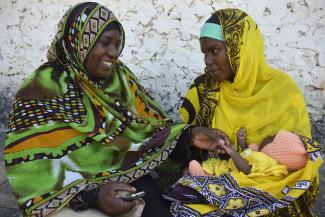D-tree International founder Marc Mitchell is no stranger to using technology in the global health context. Techies might even call him an early adopter. Twenty years ago, Mitchell wanted to apply technology in an innovative way to reduce maternal and neonatal death. He understood that there are many barriers that exist for women to deliver in facilities, including funds for transport, obtaining permission from family or local officials to travel, time needed, and geographical barriers to travel. He wondered how technology could help address these barriers and support women to deliver in facilities where both mothers and newborns could have a safer delivery. “Maternal and newborn emergencies happen so fast, if you're home and don't have resources, and the baby isn't breathing, then they are going to die. If a mother in Tanzania delivers at home, she can't get to a hospital quickly if something goes wrong,” Mitchell says. Mitchell believed the only effective way to realize change would be to address all of these barriers simultaneously. This is what inspired him to develop an integrated mobile technology program to address the issues that prevent delivery in health systems.
Mitchell, a pediatrician by training, has worked in global health for his whole career and knows that health workers can be successful in providing high quality care when they are able to get accurate assessments, give effective treatment, and offer knowledgeable advice. His research showed that very few providers followed national standards for childhood illness for several reasons including its inefficient paper format. Mitchell believed that technology could improve the use of proven standards of care and address these barriers to use. He started with palm pilots as a tool to prompt health workers to follow these protocols and today uses smartphones in the hands of health workers to make it easier for them to deliver high quality care using these protocols.
In Zanzibar, D-tree International’s “Safer Deliveries” program used mobile technology to address the multiple obstacles that women face when trying to go to a facility for delivery. Zanzibar has high rates of antenatal care and relatively good access to facilities, yet over half of the deliveries were taking place at home, leading to preventable deaths of women and newborns. Rather than taking a siloed approach, Safer Deliveries works to address all barriers to women accessing care simultaneously through a mobile application. The program empowers women to understand why a facility delivery is better for them and their baby, to develop a birth plan for where they will deliver, and to save money to pay for transport and other birth related costs through a mobile savings system. It empowers community health workers to provide effective advice to women and support the birth planning process and it supports a community transport system using local drivers and vehicles to take women in labor to health facilities. Think “Uber for mothers.” The result has been a 50% increase in rates of facility based deliveries and follow up care for mothers and baby after delivery.
U.S. company D-tree International, based in Massachusetts, was awarded funding through Saving Lives at Birth Grand Challenge in 2014 to implement and expand their program. Through its integrated mHealth solution and partnerships with local stakeholders, Safer Deliveries has been able to successfully link pregnant women with the resources they need. The program has enrolled over 25,000 clients in the Safer Deliveries program in Zanzibar and is still scaling up. Among women in Zanzibar who have delivered, the facility delivery rate has increased to 78% from a baseline of about 40%. “The success of the Zanzibar program is due to remaining focused on outcomes. It is not about designing cool apps, it is about getting women to safe deliveries at facilities,” Mitchell says.
Mitchell notes the supportive role of the Saving Lives at Birth partners, including the role that USAID has played in the success of Safer Deliveries. “USAID provides us with opportunities to work with technical expects and to better understand what we are doing and how we could make it more sustainable. They help us use our own insights in more structured and productive ways,” Mitchell says.
D-tree is currently looking at how they can build on their successes and expand their technology for use in other areas. “It is tailored to Zanzibar, but neither the issues nor the technology are unique to Zanzibar.” Mitchell says. The team is working to develop a global business strategy and program offerings for use as well as to leverage additional funding from new investors.

D-tree International
